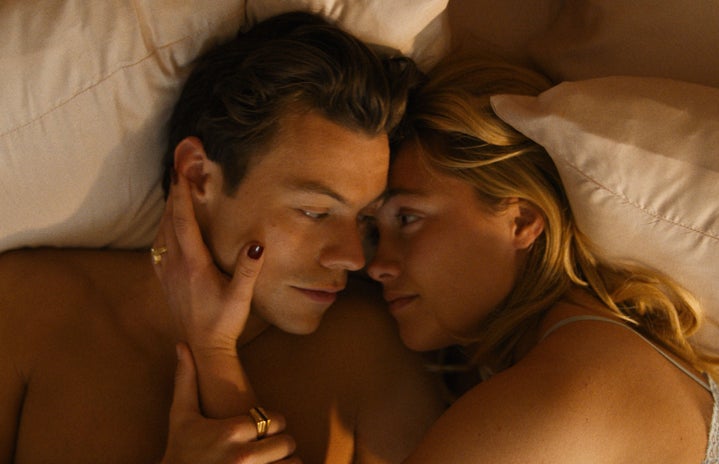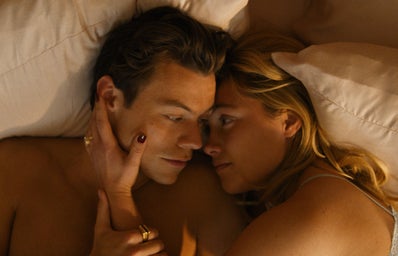*Warning: The content of this review IS a spoiler*
Olivia Wilde’s Don’t Worry Darling came out in cinemas on the 23rd of September 2022, and it got EVERYONE talking. Despite its bad reception, Wilde does address some prevalent issues occurring in the 20th century, however, did she execute it in the right way?
A SYNOPSIS
With patriarchy and misogyny at the forefront of the psychological thriller, Wilde dives into the paradoxical, dystopian-utopian world of Victory. The story follows the wobbly marriage of Jack Chambers (Harry Styles) and his wife Alice Chambers (Florence Pugh) living in a 1950s seemingly idyllic community. From the very beginning, it is apparent that the society is built on heteronormative values. There is a clear gender binary, whereby the residents of Victory conform to the hegemonic notions of masculinity and femininity, emphasising a world which strongly prescribes gender performativity as the solution to a functioning social order. Jack, the ‘breadwinner’ of the household goes out to work for The Victory Project, a job that his wife Alice, the ‘housewife’ is not allowed to know anything about. The founder of the project, Frank (Chris Pine), a tyrannical figure, perhaps better described as a cult leader, thrives off the patriarchy.
The narrative unfolds at an event Frank has hosted, welcoming new guests into the aesthetically pleasing 1950s utopia. In a steamy scene, Wilde relatively quickly foregrounds Alice and Jack’s very sexually intimate relationship where Jack is eating everything at the dinner table BUT the dinner… This immediately gives the impression that they have a healthy, exciting marriage, one that can only work because of the traditional social order. However, after Margaret, played by KiKi Layne, confronts Frank about his lies, Alice notices that things seem off about Victory, consequentially having a negative effect on the couple’s relationship when she begins to refuse to conform to the rules. It all goes south when Alice spots a plane crash in the Victory desert, where she adopts a nonconformist attitude and follows the plane.
After Margaret calls Alice to ask if she saw the plane too, Alice denies everything and hangs up the phone. That is when Alice witnesses Margaret slit her throat and fall off the roof to her death. Alice’s guilty conscience and high suspicions relating to her friend’s death leads her on a search to find answers. In an attempt to uncover Frank’s truth, she interrogates the other women’s stories about where their honeymoon destinations were, or where the couple’s met. After finding out that all their stories were practically identical, Alice demands Frank to tell them the real reason they are there. Instead, like the master manipulator he is, Frank gaslights Alice into thinking she is crazy. Realising the full capacity of Alice’s skill of observation and intelligence, Frank seeks to wipe her memory and place her back in his fantasy land. Whilst Jack continues to brainwash his so-called ‘darling’, Alice’s sheer determination to search for the truth leads her to confronting him and, ultimately, killing him. After the other women catch on, Frank’s wife decides to kill him too.
THE PLOT TWIST
It was all a simulation… After Alice’s electroshock therapy doesn’t work, she begins to have memories of her real life. It turns out that she was actually a doctor. Out of jealousy, and the feeling of emasculation, Jack decides to take it upon himself to create a better life for them. Jack finds out about a virtual reality simulation through a podcast created by tyrannical men wanting full control of women. Without her consent, Jack forces her down and places them into the ‘idealistic’ simulation. According to the character of Bunny (Olivia Wilde), when a man is killed in the simulation, they also die in the real world. So, with Frank and Jack supposedly gone for good, Alice just said a big fuck you to patriarchy.
A FEMINIST FILM?
Whilst Wilde addresses the issues of a dominant patriarchal ideology, can we call it feminist if it purely exists in a world where only white, middle-class women are affected? The feminist message becomes tainted when the movie pretty much excludes any kind of intersectionality. KiKi Layne, the actress who plays Margaret, is the only named Black woman to have dialogue in the movie. Not only that, but she is killed off within the first half of the film. Rendy Jones argues that ‘Wilde utilizes Margaret’s corpse as a device to progress Alice’s journey without consideration of the Black audiences who have suffered through the imagery of Black Trauma in the media’, reinforcing Hollywood’s lack of Black representation and lack of thought. According to Layne herself, she had quite a few more scenes in the film, but she was cut out of them. In an Instagram post, she lets her fans know that ‘The best thing about #DontWorryDarling is that I was lucky enough to meet @arielstachel. They cut us from most of the movie, but we thriving in real life’. She finishes if the post with the hashtags #GotMyCheck #GotMyMan #EverythingHappensforaReason.
SO, THOUGHTS?
In terms of the enjoyability of the movie, I would say it was a good watch. In terms of the plot, I think it had the potential to be great, but the most exciting part of the film was squeezed in right at the end of the film. I think they should have spent longer going into the details of what happened after the simulation, rather than spending most of the film showing Alice being gaslighted into thinking she was delusional. Lastly, in terms of social comment on patriarchy, it missed representation.
What are your thoughts?


